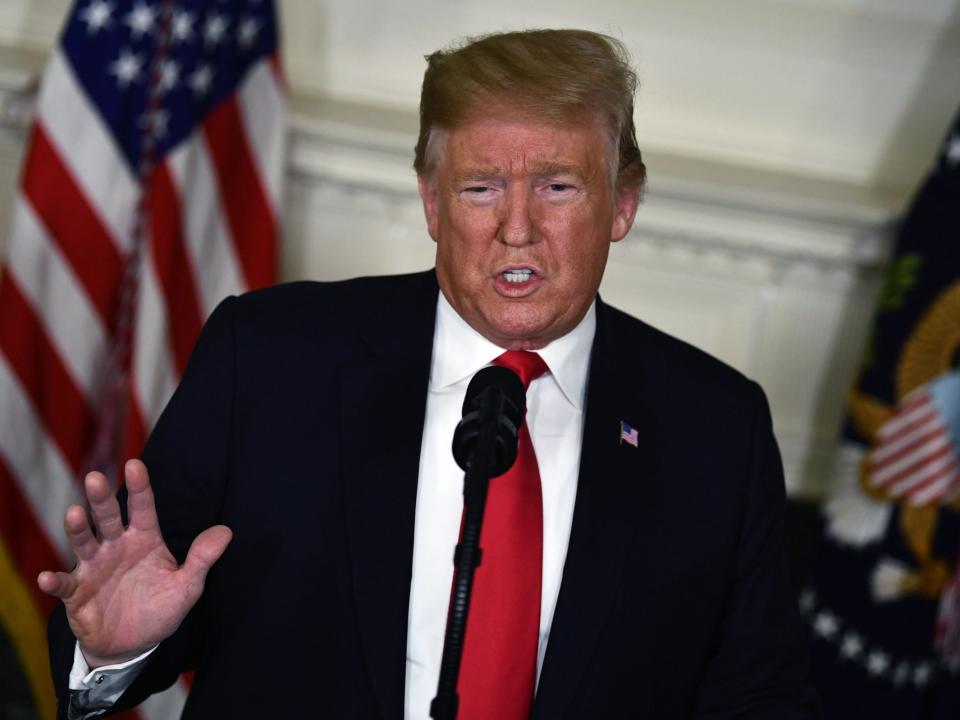Trump shutdown announcement: President offers Daca extensions for undocumented migrants in exchange for border wall funding
Donald Trump has proposed a compromise to reopen the federal government which would provide extensions to protections for certain undocumented immigrants in exchange for $5.7bn (£4.4bn) to fund a wall along the US-Mexico border.
Under the president’s plan, migrants who arrived to the country at a young age and qualified for the Deferred Action for Childhood Arrivals programme (Daca), as well as other immigrants under Temporary Protected Status (TPS), would receive extensions to their protections from deportation.
The Daca measure would affect 700,000 people and the TPS change would affect 300,000, the president said, announcing a potential three-year extension of legislative relief. “If we are successful in this effort, we will have the best chance … At real, bipartisan immigration reform,” the president said, before outlining the proposal he says received input from border security professionals. “It is a compassionate response to the ongoing tragedy,” he continued.
Mr Trump’s original demand for $5.7bn towards his signature border wall has not received enough support from lawmakers to pass the Senate. The Republican made building the wall a central campaign pledge but in his address said the barrier would not be a concrete structure “from sea to sea” – instead, a series of steel barriers in “strategic locations”.
Senior Democrats had already signalled they would reject the proposal before the president began his announcement. Nonetheless, Mr Trump said he hoped for Democrats’ “enthusiastic support” given his plan came after a string of meetings with “rank and file” members of the party.
Speaking in the White House, the president said he believed in a “safe and lawful” immigration system. But he said the current structure had been “badly broken” for some time and that “we are now living with the consequences, and they are tragic”.
He reiterated his claim that a “humanitarian crisis” was taking place at the border, and said drugs were “flooding” through the frontier – a consistent and central talking point for Mr Trump.
Mr Trump said his plan would also provide: $800m (£620m) for humanitarian assistance; $805m for drug detection; 2,750 new border and law enforcement agents; and 75 new immigration judge teams.
He said the US would attempt to create a system that would allow Central American minors to apply for asylum in their own countries. “This plan solves the immediate crisis,” the president said on Saturday. “And immediately reopens our federal government.”
House majority leader Nancy Pelosi called the compromise “unacceptable” and “not a good faith effort” to reopen the federal government, which has been partially closed for 29 days – the longest shutdown in American history.
Ms Pelosi said the president’s compromise did not have enough support to pass in the House of Representatives or the Senate.
Democrats have repeatedly opposed supporting solutions like the Bridge Act, which would provide a three-year extension to Daca protections, since they say the legislation does not solve the underlying issue of undocumented immigrants already living in the US.
In recent years the party has increasingly supported providing pathways to citizenship for many undocumented immigrants, a policy that has garnered increasing support.
Democrats have previously offered $1.6bn to beef up border security across the nation’s southern border - including some fencing - though that proposal stopped short of fulfilling the president’s demands of a sprawling, 30ft-high structure.
Mr Trump’s proposal also came in for criticism from conservative quarters, with hardline commentator Ann Coulter calling his offer of a Daca extension an “amnesty” and an immigration campaign group suggesting the plan was “a loser for the forgotten American workers who were central to his campaign promises”.
Mike Pence, defending his boss, said that “this is not an amnesty bill”.
Despite the opposition Mitch McConnell, the Republican Senate majority leader, said he would “move to this legislation this week” and added that “with bipartisan cooperation, the Senate can send a bill to the House quickly so that they can take action as well”.
“Everyone has made their point – now it’s time to make a law,” he said.
GOP senators have been blocked by Mr McConnell from voting on bills already passed by the Democrat-controlled House aimed at reopening the government. In a statement following Mr Trump’s address the majority leader said those measures could not have “actually [resolved] this impasse” because they lacked presidential support.


